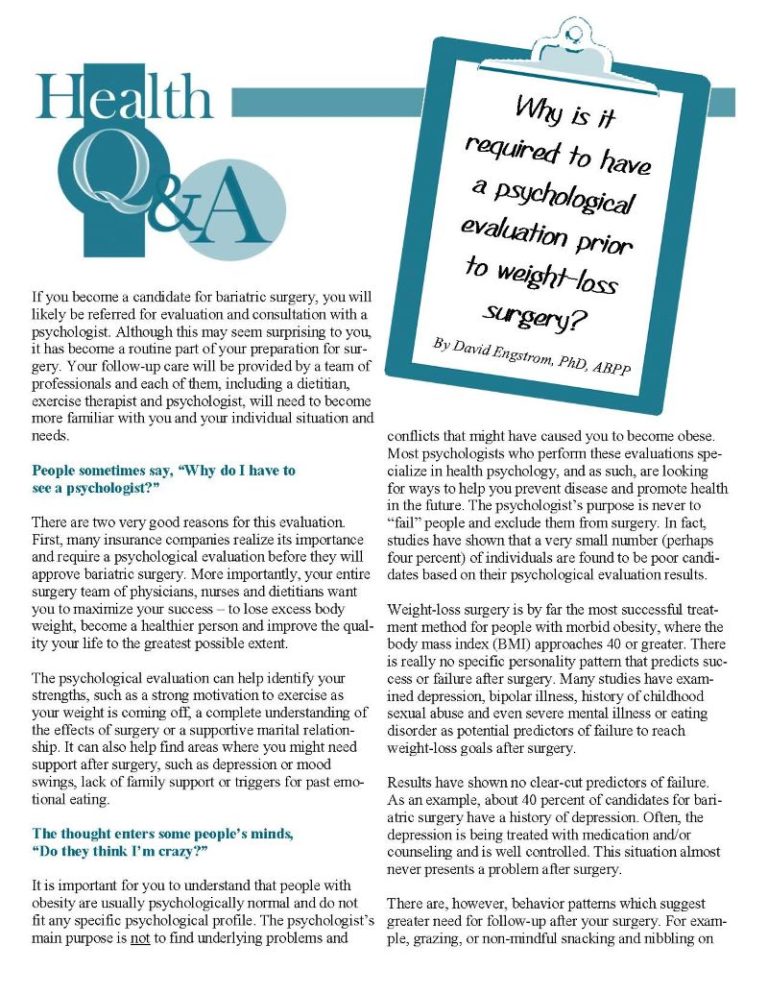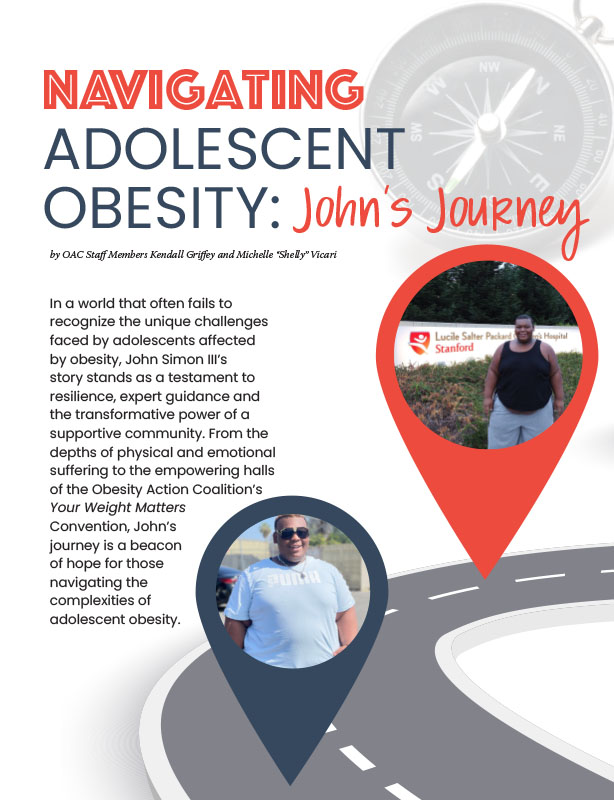Why is it required to have a psychological evaluation prior to weight-loss surgery?


by David Engstrom, PhD, ABPP
Summer 2006
If you become a candidate for bariatric surgery, you will likely be referred for evaluation and consultation with a psychologist. Although this may seem surprising to you, it has become a routine part of your preparation for surgery. Your follow-up care will be provided by a team of professionals and each of them, including a dietitian, exercise therapist and psychologist, will need to become more familiar with you and your individual situation and needs.
People sometimes say, “Why do I have to see a psychologist?”
There are two very good reasons for this evaluation. First, many insurance companies realize its importance and require a psychological evaluation before they will approve bariatric surgery. More importantly, your entire surgery team of physicians, nurses and dietitians want you to maximize your success – to lose excess body weight, become a healthier person and improve the quality your life to the greatest possible extent.
The psychological evaluation can help identify your strengths, such as a strong motivation to exercise as your weight is coming off, a complete understanding of the effects of surgery or a supportive marital relationship. It can also help find areas where you might need support after surgery, such as depression or mood swings, lack of family support or triggers for past emotional eating.
The thought enters some people’s minds, “Do they think I’m crazy?”
It is important for you to understand that people with obesity are usually psychologically normal and do not fit any specific psychological profile. The psychologist’s main purpose is not to find underlying problems and conflicts that might have caused you to become affected by obesity. Most psychologists who perform these evaluations specialize in health psychology, and as such, are looking for ways to help you prevent disease and promote health in the future. The psychologist’s purpose is never to “fail” people and exclude them from surgery. In fact, studies have shown that a very small number (perhaps four percent) of individuals are found to be poor candidates based on their psychological evaluation results.
Weight-loss surgery is by far the most successful treatment method for people with morbid obesity, where the body mass index (BMI) approaches 40 or greater. There is really no specific personality pattern that predicts success or failure after surgery. Many studies have examined depression, bipolar illness, history of childhood sexual abuse and even severe mental illness or eating disorder as potential predictors of failure to reach weight-loss goals after surgery.
Results have shown no clear-cut predictors of failure. As an example, about 40 percent of candidates for bariatric surgery have a history of depression. Often, the depression is being treated with medication and/or counseling and is well controlled. This situation almost never presents a problem after surgery.
There are, however, behavior patterns which suggest greater need for follow-up after your surgery. For example, grazing, or non-mindful snacking and nibbling on high-calorie foods between meals can be a problem if not identified and stopped once you have had surgery. It is a pattern that significantly reduces your chances of success.
Your evaluation will probably include psychological testing, such as personality tests, mood inventories and other questionnaires. This paperwork is often completed before meeting with the psychologist. You will also have a face-to-face interview, usually scheduled for about an hour.
It is often suggested that you bring a family member or close friend along to the interview if possible, since it is important to know that you have good family and social support. Results of the testing are usually discussed during this time, and the psychologist will want to know about your family and social history, any medical or psychological concerns you may have and your reasons and motivation for seeking the surgery. You will also be asked about your past and present eating patterns, your level of activity and exercise and your current family and social situation.
The psychologist can often answer questions you might have. For instance, some people are fearful of the surgery itself and may be able to benefit from stress management techniques. There is evidence that people who are relaxed prior to many types of surgery not only heal faster, but also have less post-operative pain. The psychologist may be able to guide you toward techniques which may help with this.
Others may be concerned about future feelings of “deprivation,” such as not being able to eat their favorite rich, high-calorie foods after surgery. The psychologist will help you to understand that these feelings, if they occur at all, will usually be short-lived. And, if you feel the need for a referral for counseling, please feel free to ask. Just remember, the psychologist is part of your “safety net” after your surgery whose primary focus is your ultimate success.
About the Author:
David Engstrom, PhD, ABPP, is a clinical health psychologist, board certified in Clinical Psychology. He practices in Scottsdale, Arizona and is a psychologist at Scottsdale Bariatric Center. An active member of the American Society for Bariatric Surgery and is a specialist in applying mindfulness techniques to long-term weight management. Dr. Engstrom currently serves on the OAC Advisory Board.
by Robyn Pashby, PhD Winter 2024 “No one is ever going to date you if you don’t…
Read Articleby Leslie M. Golden, MD, MPH, ABOM Diplomate Winter 2024 The journey to overcoming obesity is a…
Read Articleby OAC Staff Members Kendall Griffey and Michelle “Shelly” Vicari Winter 2024 In a world that often…
Read Article








